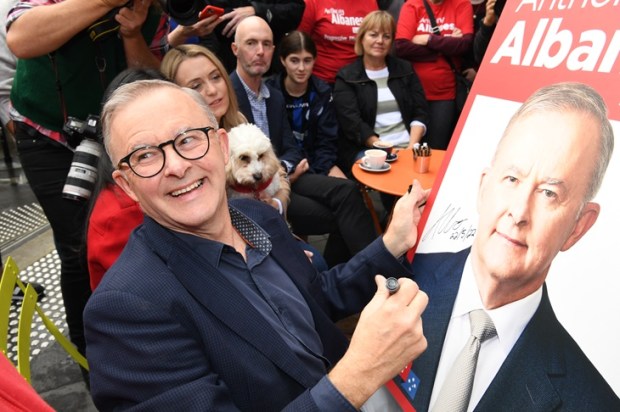The colour of authoritarianism is grey. I learned this the first time I sat in a wonderful old town square west of Warsaw towards the German border. I was taken by the bright paintwork on the outside of a number of the buildings, compared to smatterings of a ‘certain grey’ across others. When I asked about the variation in colour choice, my host explained that under the Russian occupation ‘where we were told that we all work hard and will be taken care of’ the only colour the State supplied was … grey.
I remembered this while thinking about the homework our Prime Minister was getting up to on the weekend. Albanese announced his reshuffle of leaders after two senior ministers retired earlier in the week. What followed has been an act of charades. Why ‘charades’ I hear you say? In reply, I have a mini-Kel Richards moment to offer as I reach for my 1,000+ page Webster’s hard copy dictionary. Yes, I have it confirmed – a charade is when one engages in a thin pretence or make-believe action.
The appointments made by our Prime Minister are a pretence. He will insist these changes are for the good of the country, and they will only reinforce the soft totalitarianism that continues to push Australia down the path toward harder totalitarianism. Each continuing minister, and each new one, will demonstrate this dynamic in their words and actions. The pattern is there for the seeing.
Author Rod Dreher explains this pattern in his book Live Not by Lies. The book was prompted by people saying to Dreher (also author of The Benedict Option) that they were worried about the patterns they were starting to see in American politics. Political déjà vu. This may not be very noteworthy, excepting that these people lived through communism. They believed that they were seeing those grey shades re-emerge beneath the colour of democracy.
Dreher warns that the first thing to notice is when governments stop conceptualising people as individuals and seek to impose their justice in terms of group identification. The Voice to Parliament debacle is a clear example of soft totalitarian justice being imposed on individuals by a proposition that would have institutionalised division amongst groups, with no apparent resolution of the apparent grievance causing the division.
Dreher adds that the movement from soft-to-hard totalitarianism then comes in, ‘…a form of government that combines political authoritarianism with an ideology that seeks to control all aspects of life … it exercises control, at least initially, in soft forms. This totalitarianism is therapeutic. It masks its hatred of dissenters from its Utopian ideology in the guise of helping and healing.’
It is no wonder that Voice advocates used denigrating language of individuals who disagreed with them (as some are still doing). But does this apply across the main ministries of the current federal government? I believe so. Here are some examples of this pattern appearing before our very eyes, in addition the Voice charade:
The Economy: The tax cuts that have been implemented have been trumpeted as being as an act of kindness in helping us come to grips with the increases in the cost-of-living pressures. This is the therapeutic frame. What is avoided in any in-depth discussion is any consideration that those cost-of-living realities are being generated in significant part by the way the government is managing the economy. For example, tax cuts that do include the highest marginal rates would, according to economists such as Laffer, stimulate investment, employment, and even tax revenue; plus, it would help against bracket creep. But that doesn’t matter, because such largesse about ‘look what we kind people are doing’ sounds good in the sound bites.
Energy: Of course, the charade here is closely linked to the economy one. ‘We are saving you from certain planet death…’ is the rescue-from-harm message from this part of the totalitarian messengers. What is so telling, and is also a theme that is described in books like Dreher’s, is the lack of willingness to engage in the principles and details around the debate. You may have more success than I, but I cannot find one government senior minister who will engage with the scientific explanation in Koonin’s book Unsettled, or who will even explain why the nuclear moratorium cannot at least be lifted to allow open and democratic processes to eventuate. Oh, but silly me, why should I think that feasible in our movement to increased totalitarianism?
The Workplace: What do we need in economic times such as this? We need people who are willing and able to increase our productivity. But no, that is not what we are told is most important. Our therapeutic needs are foremost in the leaders’ minds, as they tell us that the current shifts in IR legislation will be the best that workers have seen. Forget the impact on small and medium-sized businesses. Forget the big businesses scaling back and going elsewhere. We are being taken care of better – or thus the tale goes. But note that all the current changes continue to put more control in the government’s hands, while they respond to ‘their mates’ as a group, while cruelling the lives of families and individuals.
Security: This charade was off to a flying start when the government initially came to power. Trips happened to all over the globe. We are told, again, about how this was taking such good care of our national concerns. What has eventuated? We are less prepared to sustain our transport security and our armed forces. Ironically, given all the ‘care’ about the environment and energy, we have much less energy security paired with increased prices of electricity. We have become more dependent on the biggest threat in the Asia-Pacific while they increase their field leading emissions. And we should not forget the borders – the ‘freedom fighters’ in the Government are opening us up as a caring nation through massive and thoughtless immigration, while Australian Jews have to guard their safety, all kinds of people support a terrorist government in the form of Hamas, and certain Muslims advocate for Sharia law.
I could go on with reference to Education, Health and Business, who have so thoroughly embedded Diversity, Equity and Inclusion into their systems to help people in certain groups feel better, but in fact hurt significant numbers whose faith in achievement by merit is shelved. But I think the charade pattern is clear in all these areas of government.
Dreher has a section where he gives seven pointers to help identify the movement from soft to hard totalitarianism. As you read them, ask yourself, ‘Does this describe our national trajectory?’
- Loneliness and social atomisation
- Losing faith in hierarchies and institutions
- The desire to transgress and destroy
- Propaganda and the willingness to believe useful lies
- A mania for ideology
- A society that values loyalty more than expertise
What think ye?

























